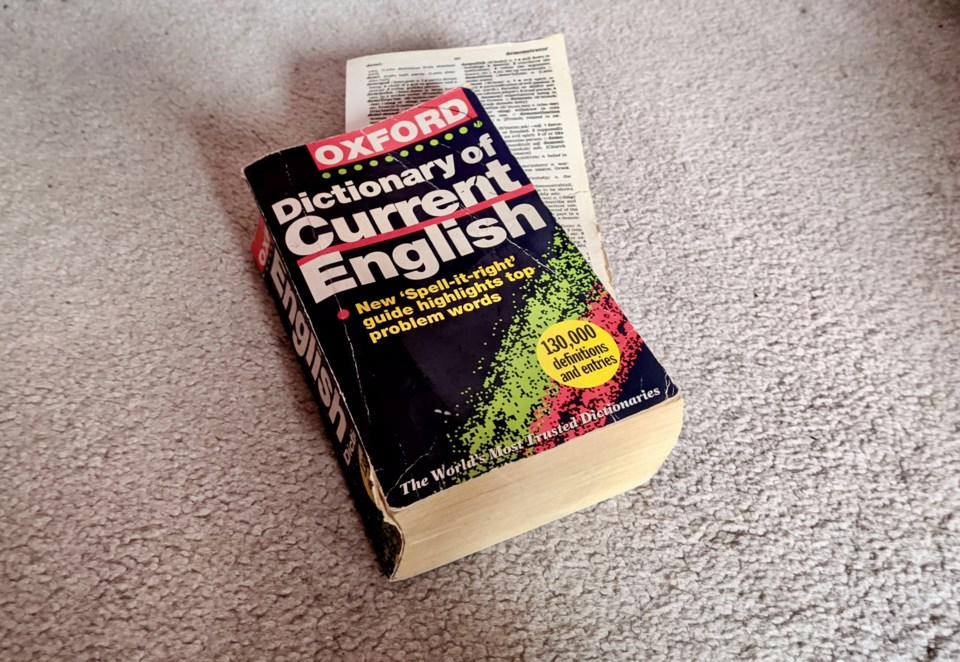I have a larger problem with spoken words than written ones.
Strange this is the case, given I’ve made my living for about 40 years writing about what other people say.
Granted, many of those who I’ve written about are politicians of all stripes, officials from all levels of government, bureaucrats, public relations spokesmen and spokeswomen.
They have a certain way of speaking, so that you often need to sift through their words to find meaning.
As such, they use certain words and phrases that I find annoying.
Maybe you don’t. Maybe your eyes just glaze over when you hear 'bureau-babble', as I call it, although that might not be a real word.
But it nearly always catches my attention.
Let’s start with a word that I keep hearing, from local politicians to city staff and police officials.
That word would be ‘robust’. Actions are described as ‘robust’, as are policies, programs, etc.
For this exercise, let’s use my daughter’s Oxford Dictionary of Current English (published 1998) for reference.
Too old? Too bad.
‘Robust’ means strong and sturdy, vigorous, bold, firm, unyielding — all better, more exact words than ‘robust’.
That example too obscure for you? Maybe.
How about the word ‘fulsome’? I keep hearing it to describe everything from discussions to reporting on this or that matter.
But I think the word wanted is full or complete.
My Oxford dictionary says ‘fulsome’ means excessive or cloying or insincere.
How about the word ‘signage’. As in there needs to be proper ‘signage’ so people aren’t walking in the out door at such and such a facility.
I couldn’t even find the word ‘signage’ in my dictionary (maybe it is too old), but the real word is signs, or sign.
Nobody says “slow down, there’s stop signage ahead!”
They say “slow down, there’s a stop sign ahead!”
And we keep hearing about engagement (not to be married), the importance of engaging with this or that group about this or that issue.
My daughter’s dictionary has a number of definitions for ‘engage’, including to hold fast a person’s attention, bind by a promise, take part and undertake.
I think the words or phrases we’re grasping for here are speak to, have a conversation with, talk to, even converse with… all more accurate, in my mind, than the bland ‘engage’.
There are also phrases that I find particularly annoying.
How about ‘going forward’, although it seems to have fallen out of favour with bureau-babblers of late.
As in “going forward, we’d love to give the community some of its tax money back for this project”, the MP or MPP says (or whoever is making a fuss about returning a small percentage of money to taxpayers).
As opposed to ‘going backwards’?
Or how about ‘reached out’? As in “we’ve reached out to the community to gather perspectives on this project.”
You mean you gave the neighbours a phone call or sent them an e-mail to get their opinions?
It’s not only government-types who take liberties with the English language.
Have you ever watched a hockey game on TV and heard the colour commentator say “well, Joe, as long as the Leafs continue to successfully ‘activate their defencemen’, the Bruins won’t be able to get out of their own end.”
‘Activate’ in hockey lingo means the defenders move up instead of staying back, particularly on a rush or down the boards in an opponents' end. (Of course, activated defencemen sometimes get caught up ice, leading to odd-man breaks and often goals the other way.)
Perhaps I’m nit-picking about these words and phrases that so annoy me.
I probably lapse into some of them when I’m writing from this or that staff report, memos, press releases and other such correspondence (usually e-mails, sometimes texts or Facebook messages).
And the English language is not stagnant, but speech which has changed and evolved for centuries.
Maybe the above words and phrases are being used accurately by the speakers, whose sincerity I am not doubting.
That’s what they think these words mean.
I respectfully disagree.
And will continue to point out my disagreement.
Bob Bruton is a staff reporter at BarrieToday. His editor often asks him to reach out to people for stories.
